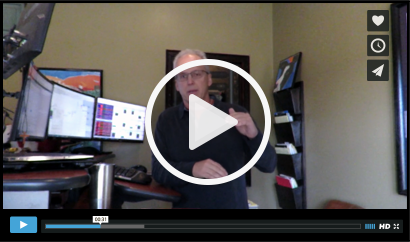I have been trading options for a number of years, but I have never traded a credit or debit spread. If I write an out of the money put and buy a further out of the money put and the price of the stock goes below the put that I have written am I stuck with buying the stock at the strike price?
If you do nothing at expiration or the stock is put to you before expiration, yes you will have to buy the stock at the strike price of the put you sold. If the stock’s price is between the strike of the put you sold and the strike of the put you bought, at expiration, the put you purchased will be worth zero, and the put you sold will be worth whatever portion is in the money. On a $55 by $50 bull put spread where you sold the $55 put and bought the $50 put, and a stock is at $52.50 on expiration, the $55 put will be worth right at $2.50. That means you will have the stock put to you unless you do something.
What we usually do in that situation is simply buy the put back at expiration for the $2.50. That means our loss is $2.50 per option plus what we paid per option on the put we bought minus the credit we took in. If we don’t buy the option back, we have to be ready to buy the stock at the price of the put we sold.
If the stock is put to us before expiration (it can and does happen if the put is well in the money), we then either can sell the put we bought and use the proceeds to help buy the stock put to us (and then we want the stock to run right back up), or we can exercise the put we bought to put the stock to someone, pocket that money and then use those proceeds to buy the stock at the higher price when it is put to us. Our loss will be the same (commissions may change that) because you still have the proceeds from the sale of the stock to another to buy the stock that is put to you. You would not do that unless the stock is below both puts in the spread, for obvious reasons. Further, you most likely have to deal with greater commissions on the stock transaction, but that is not always the case. It depends upon your commissions schedule with your broker.
We like to write spreads on strong stocks that are breaking resistance or breaking out of a solid pattern. That way, the pattern acts as support if the stock falls back on us. If the support does not hold, that is a good indication to us that we should exit the trade, usually buying back the puts we sold and letting the puts we bought increase in value if the stock continues to fall. That way we can make some of the money back or even break even on the trade. We have even made money when a stock really crashed, but that is the unusual case.
Spreads are great because they allow you to take positions and take advantage of a stock’s climb without having to put up your own money. There are traders who only trade spreads or sell puts. Spreads allow you to take advantage of this tactic if you do not have a lot of cash to put into margin. But, you have to be ready to act if the play turns against you and you are concerned about the stock being put to you.

